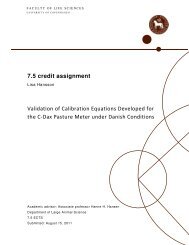Innovative Technology and Sustainable Development of Organic - 1.
Innovative Technology and Sustainable Development of Organic - 1.
Innovative Technology and Sustainable Development of Organic - 1.
You also want an ePaper? Increase the reach of your titles
YUMPU automatically turns print PDFs into web optimized ePapers that Google loves.
image. The third area (questions 4, 7, 9 partial, <strong>and</strong> 11) focused on the participants’ perceptions on<br />
other sustainability aspects <strong>of</strong> concern found in the literature, such as animal health, natural resources,<br />
technical dependency, farmers satisfaction, <strong>and</strong> consumer behaviour.<br />
A confrontation with identified relevant sustainability issues (question 9) was presented rather late<br />
in the session to avoid influencing the group, <strong>and</strong> was introduced once they had discussed the possible<br />
use <strong>of</strong> AMS on organic farms in the earlier questions.<br />
Incidentally, the participants themselves focused on other aspects than those originally planned by<br />
the moderator. On these occasions, the statements <strong>and</strong> opinions were indexed to the relevant aspects.<br />
2.4 RESULTS<br />
2.4.1 Participants Viewpoints on <strong>Organic</strong> Farming<br />
When confronted with the statistics showing the decrease in growth <strong>of</strong> organic milk production <strong>and</strong><br />
the decline in the number <strong>of</strong> organic dairy farms in Denmark in the period 2000–2004, nobody<br />
perceived the current stagnation as a real threat or a negative signal. Some even seemed surprised by<br />
these numbers. In general, all four groups perceived a period <strong>of</strong> stabilization <strong>and</strong> consolidation<br />
important after a period <strong>of</strong> fast growth in the 1990s. They agreed that increased concentrate prices, the<br />
accomplishment <strong>of</strong> 100% organic feeding, <strong>and</strong> lower organic premiums <strong>and</strong> subsidies are reducing the<br />
financial incentive to convert from conventional to organic dairy production. This reduced conversion<br />
together with the structural development resulting in fewer farms with increased production, results in<br />
a plateau in the number <strong>of</strong> organic farms. A better marketing effort could, according to the<br />
participants, have led to higher sales <strong>and</strong> consequently a higher percentage <strong>of</strong> organic farms.<br />
Dutch participants generally were more optimistic about future development than Danish ones.<br />
They identified some positive ongoing developments, such as nature management, as possibilities for<br />
generating extra income <strong>and</strong> stimulating positive future expectations among the producers. They also<br />
mentioned that continuous growth <strong>of</strong> the sector should not be the only objective.<br />
When discussing the future market share <strong>of</strong> organic dairy production in each country, no<br />
participants predicted a serious decline in organic dairy production. Dutch farmers expected a future<br />
market share <strong>of</strong> organic dairy production <strong>of</strong> on average 10% (range 5%–22%), whereas Danish<br />
farmers expected a future share <strong>of</strong> on average 12% (range 7%–22 %). The current market share <strong>of</strong><br />
organic dairy production is around 2.5% in the Netherl<strong>and</strong>s <strong>and</strong> 10% in Denmark. Hence, Dutch<br />
farmers expected a larger growth than Danish farmers did. Advisors, however, did not want to predict<br />
exact percentages. Danish advisors stated a status quo or small growth in the market share, whereas<br />
almost all Dutch advisors expected an intermediate growth in the market share <strong>of</strong> organic dairy<br />
production.<br />
When farmers were asked why they were farming organically, Dutch <strong>and</strong> Danish farmers<br />
mentioned the following: absence <strong>of</strong> chemicals, economic prosperity, satisfied <strong>and</strong> happy with the<br />
work <strong>of</strong> farming, responsibility for maintaining a natural environment, animal welfare, worth living in<br />
for the next generation, <strong>and</strong> pr<strong>of</strong>essional challenge. They also mentioned the skills to manage weeds<br />
without chemicals <strong>and</strong> animal health problems without prophylactic treatments. All farmers<br />
interviewed were satisfied with current practices, <strong>and</strong> had a positive attitude towards the future.<br />
Advisors in both countries had the same perception <strong>and</strong> stated that even where economic prosperity<br />
had been the main motive for some farmers to convert from conventional to organic production, some<br />
years <strong>of</strong> practice <strong>of</strong>ten showed that other motives became more important, like the joy <strong>of</strong> farming.<br />
Thesis Frank W. Oudshoorn 27




